UK Press
TV Times
TV Times is a weekly TV listings magazine in the UK, and the "official" magazine for the ITV network. Due to copyright rules prior to 1991, it was the only place where weekly listings for ITV were printed (BBC listings were only available in the weekly Radio Times magazine; the two were the most popular magazines in Britain in the 1970s). In 1975 there was a local edition for each of the 15 ITV regional stations; the TV listings were local, but the cover and most feature articles were shared across all editions.
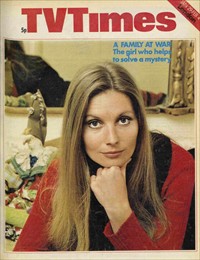
Catherine Schell made the cover of TV Times in January 1972, and appeared in several articles in 1972 and 1973. There was also an interview with Zienia Merton in 1970.
Devoted to a single network, you would expect most ITV programmes to have generous coverage. But Space: 1999 was shown at different times in different regions, so feature articles didn't make sense. See also ITV listings and Granada edition listings.
Not all of this content was shared across all TV Times editions.
The first mention of the show (misnamed as "Space 99"!), over a year before it would appear on television
I was invited to see the first nuclear explosion on the moon and was promised a gigantic bang that would make an atom bomb look like a firework. Adventurous chaps like me don't pass up such opportunities, but honestly, I was terrified. And I was only watching the scene on a studio set.
Special effects are doing the tricks for a new series, Space 99, which you can see next year. Husband-and-wife team, Martin Landau and Barbara Bain (above) are the stars. Remember them in Mission Impossible, which has been seen in 69 countries and in 18 different languages? Another husband-and-wife team, Gerry and Sylvia Anderson (Thunderbirds and U.F.O.) are producing 24 episodes, each costing £100,000.
No wonder ATV chief Sir Lew Grade is just back from Rome looking like the man who broke the bank at Monte. He's footing the £2 million bill, along with £3 million for a series The Life of Jesus.
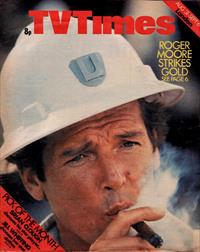
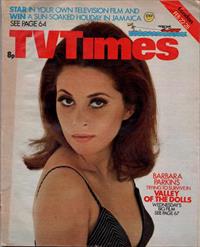
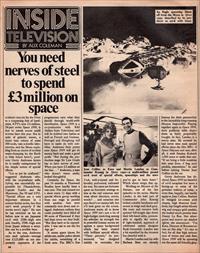
Already hailed by the press as a surpassing feat of hardware, ATV's new £3 million, 24 part series Space: 1999, is due to smash across small screens later this year. But in spite of galactic wastes, a moon base colony of some 300 souls, vast scientific laboratories, and the Moon exploding from an excess of nuclear waste dumping by the Earth (a little lesson here?), producer Gerry Anderson insists he is totally unimpressed by the simple notion of special effects.
"Let us not be confused," suggested Anderson who, with his producer wife, Sylvia, was successfully responsible for Thunderbirds, Captain Scarlet and the Mysterons, Joe 90 and UFO. "Special effects are a very important element in a science fiction series, but they can't work properly if the stories aren't right" He says he has switched on his set before now to see Japanese sci-fi with 250ft.-high ants and, frankly, 250ft.-high ants from Japan without a story-line can be a terrible bore.
As to the cost, Anderson sees each episode - average cost £125,000- as not desperately expensive if the programmes earn what they should through world-wide distribution. Space: 1999 is a co-production with RAI (Italian State Television) and will be dubbed into Italian as well as French and German. Portugal and Hong Kong will have to make do with subtitles. Anderson feels pretty sure Space: 1999 will get its money back and make a good profit. "But during the production stage Sir Lew Grade has to have nerves of steel when you have £3 million on the line . . ." Anderson, a man who doesn't wince easily, looked thoughtful.
Certainly for Space, the past 14 months at Pinewood Studios have hardly been a rest cure. The unit turned out a show every 11 days with a special effects group working from one stage in parallel with another. Sets were continually torn down and rejigged. Anderson reckons they could probably have filled all 90 acres of Pinewood if they had kept every set they built. "But they have to be expendable. I was sad to see the Ice Age go."
It seems space shows for adults are, unlike police shows for adults, something of a fresh area. The BBC's Star Trek, well-scripted and believably performed, indicated the way. No more are fortunes spent on futuristic settings so that at the end someone says what about directors, actors, words? ... and someone else says there's no money left, but it'll look great on the screen. Anderson wants all to know Space: 1999 isn't just a lot of high-budget junketing among the nebulae: its strength lies in powerful human stories set against a space background which last been treated with brilliant special effects "These pictures," he pronounced, "are designed mainly to entertain, but you've got to have heart." Which just about wraps that up.
Working on Mission of the Darians, one of the last episodes in the series, Martin Landau in the lead part of Commander John Koenig looks suitably handsome and severe in beige and dark grey. His tunic and trousers both sported full-length zips down their left-hand sides, presumably to signify the unisex, if right-handed, approach of celebrated unisex designer Rudi Gernreich. Landau was a bit mystified by the trousers but cheerful with it.
Martin Landau and his wife Barbara Bain are already famous for their partnership in the incredibly long-running Mission: Impossible. Playing together again in Space: 1999, their publicity stills depict them as fairly perpetually fraught. In fact, Landau is a merry man. He avowed he had never seen such special effects since the film 2001: A Space Odyssey and says, after all, it took Stanley Kubrick 2000 years to make that one. "If we bring a little sunshine into your lives - I beg your pardon, moonshine," he said before joining Joan Collins on the set.
Gerry Anderson has declared Space: 1999 no basinful of sci-fi escapism but more a facing-up to some of the grimmer realities of today; a term that, happily, can hardly apply to Joan Collins. Radiant in vestigial ice-cream pink drapes and strappy gold sandals, she looked much prettier than Danny La Rue. Her silver-green' and mauve eye shadow aglow, she announced: "I'm Kara, Director of Reconstruction on this ship." It's nice to feel for all that high seriousness of intent and cash flow, Space: 1999 will be spooning out the same old friendly glop.
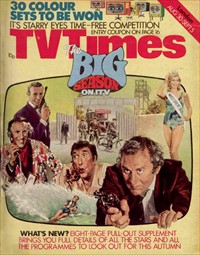
This issue promoted the new ITV autumn programmes as the "Big Season". For most regions, Space: 1999 started on Thursday 4th September.
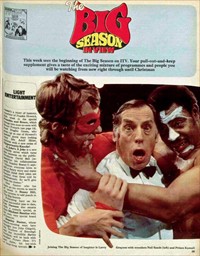
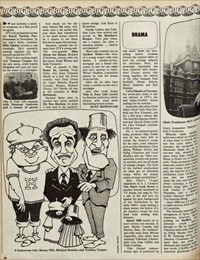
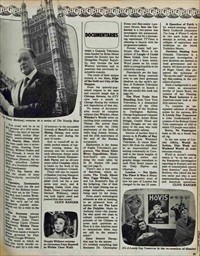
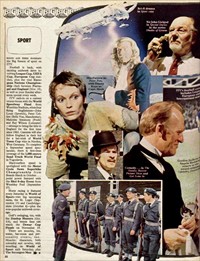
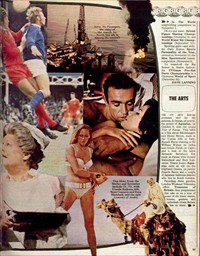
This was the article, profiling different ITV series. Space: 1999 is mentioned on page 30, with an Eagle in the photos on page 32. The Anthony Valentine Raffles pilot was aired on 10 September 1975.
Space 1999 bursts on to your screens this autumn. It stars Martin Landau and Barbara Bain, the husband-and-wife team from Mission Impossible, plus guest stars Anthony Valentine, Christopher Lee, Joan Collins and Peter Cushing.
This 24-part science- fiction epic is produced by Gerry (remember Thunderbirds ?) Anderson.
Whereas many similar series have relied on rocketry of some kind to launch the cast into outer space adventures, the occupants of Moonbase Alpha are on a one-way trip, stranded in space when their chunk of Moon is blown out of Earth orbit. Their adventures bring them into contact with a lady with two brains (Judy Geeson), the survivor of a dying civilisation (Joan Collins), a man who can magically create his own surroundings (Peter Cushing), a domed- headed being who, if you look closely, is Anthony Valentines and a disembodied character known as The Supreme Being.
Space 1999 cost £3 million to make and has been sold to 101 countries.
The futuristic sartorial extravagances of Space 1999's characters, however, have nothing on Raffles, the debonair crook who's brought to life by Anthony Valentine next week.
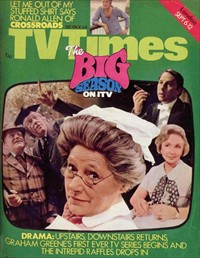
The next issue also features the "Big Season" on the cover. In London the first episode was shown on Saturday 6th September, while the rest of the country would see the second episode (Force of Life) on Thursday 11 September.
British Television's most spectacular series, a £2,500,000 epic called Space 1999, continues on Thursday. It started last week with the Moon being blown to pieces by an explosion of atomic waste. Moonbase Alpha and its inhabitants are thrown out of orbit into space, their adventures taking them through a 24-part series.
Sir Lew Grade, head of ATV, says his company's project is "the most spectacular, expensive and exciting space science fiction series ever made for television."
After a day on the set at Pinewood, I don't doubt his claims. If you were awed by the scope of Stanley Kubrick's 2001: A Space Odyssey, you'll be stunned by this.
Martin Landau, a regular star of the series with his wife, Barbara Bain, says: "Hollywood never did anything on such a scale as this."
The programme was inspired by the idea that one day the Moon may be used as a base for investigation of deep space, and as the first outpost of this Earth's defences.
Producers Gerry and Sylvia Anderson, who made their names with puppet spectaculars, work on the theory that the breakaway Moon is a rogue planet wandering through space; their theme is the inhabitants' hope of finding a new home.
Pinewood studios have been like gigantic adventure playgrounds during the past months, with the Andersons enjoying their work with real-life actors.
In addition to Martin Landau and Barbara Bain, who were together in Mission Impossible, the series features former Fugitive-hunter Barry Morse and a host of heavily disguised guests. They include Anthony Valentine, Roy Dotrice, Christopher Lee, Peter Cushing, Margaret Leighton, Richard Johnson, Joan Collins, Joanna Dunham and Brian Blessed.
Watch, too, for Catherine Schell as a wicked robot lady of space, and Catherine Mortimer, a leather-clad Woman's Libber and rocket ship commander.
Meanwhile, back on Earth, Sir Lew has already recovered much of the money spent on production. Space 1999 will earn £2,500,000 in America, and the series has been sold in many other countries.
Caption: Weird people, advanced machinery and complex sets combine to give Space 1999 its futuristic atmosphere. Evil has a beautiful face in the episode Guardian Of Piri, with Catherine Schell (above) as a wicked robot; idealism wears the bizarre features of Zantor, played by Christopher Lee (left), in Earthbound. The nerve centre of the space operations in Moonbase Alpha (below).
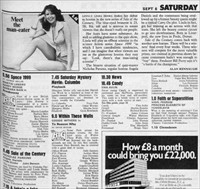

6 September 1975. Linda Hooks joined the ITV gameshow Sale of the Century with series 3, starting Saturday 6 September 1975 (in London it followed immediately after Space: 1999). Her episode, Mission of the Darians, would not be shown until November. This feature appeared above the first episode of Space: 1999 in London and Anglia; we do not know if it appeared in other editions.
Lovely Linda Hooks makes her debut as hostess in the new series of Sale of the Century. The blue-eyed brunette is 23, 5ft. 8in. tall and is anxious to assure viewers that she doesn't really eat people.
Her fears have some substance. As well as adding glamour to the quiz show, Linda will play an offbeat scientist in the science fiction series Space 1999 "in which I have cannibalistic tendencies, and I can imagine that when viewers see me as the glamorous hostess they may say: 'Look, there's that man-eating scientist'"
The bizarre situation of quiz-master Nicholas Parsons, regular hostess Angela Daniels and the contestants being swallowed up a former beauty queen might be a typical Carry On plot. Linda in fact, got her training as an actress with that team. She left the beauty contest circuit to go into show-business. Born in Liverpool, she now lives in Poole, Dorset.
Sale of the Century comes back with another new feature. "There will be a winners' final every four weeks. Three winners will compete for the more valuable prizes, not claimed in previous shows because contestants hadn't won enough to "buy" them. Producer Bill Perry says it's "a battle of the champions."
Alan Kennaugh
A competition to win the Omnia board game. UK journalist Peter Fairley (1930-1998) was well known for ITV's coverage of the Apollo moon landings, and wrote for both the TV Times and Look-In.
NOT ONLY is the autumn The Big Season for ITV programmes, it's also a bumper time for TV Times FREE competitions. Over the next three weeks, week in view will be offering a total of C280-worth of prizes to readers in simple-to-enter competitions.
This week we're offering 25 Space 1999 games - a space adventure played out on a board - which is linked to the spectacular new ITV series. The game is made by Omnia and is available in leading stores, price £3.95.
Peter Fairley, TV Times Science Editor, has set six questions. All you have to do is give the answers from 1 to 6 on a postcard, marking your answer a, b or c against each number. Send your entries to "Space 1999", P.O. Box 40, Kettering, Northants., to arrive not later than first post on Mon- day October 6, 1975. The first 25 all- correct entries will receive a game.
Here are Peter Fairley's questions:
- Where on the Moon did the first land? (a) Ocean of Storms (b) Sea of Tranquillity (c) Fra Mauro
- Who was the last man to walk on the Moon? (a) Shepard (b) Cernan (c) Schmitt
- How many Apollo missions went to Moon and back? (a) 9 (b) 10 (c) 8.
- How many men have lived in Skylab? (a) 6 (b) 9 (c) 12.
- What win America's next manned spaceship, due to make its maiden flight in 1979' be called? (a) Venturer (b) Orbiter (c) Viking.
- Russia now has two unmanned space craft on the way to a planet. Which planet? (a) Mars (b) Venus (c) Mercury.
The answers appeared in the "week-in-view" column for 10-16 January 1976, p20.
Readers of week in view obviously have an eye for outer space to judge by the large numbers of entries we had for our free Space 1999 Competition. The first 25 all-correct entries each received a Space 1999 game from Omnia. The answers to Peter Fairley's questions were: 1, Sea of Tranquillity (b), 2, Schmitt (c); 3, 9 (b); 4, 9 (b); 5, Orbiter (b); and 6, Venus (b).
Promoting the Clapperboard Gerry Anderson documentary, 13 October 1975. There is only a brief mention of Space: 1999 (which started in most regions a few weeks previously).
This week and next, Clapperboard salutes Gerry Anderson, film-maker extraordinary who brought puppet power to television with such series as Fireball XL-5, Stingray, Thunderbirds and Joe 90. Copyrighted as "Supermarionation", the glass-fibre dolls blinked, walked and talked could even see their lips move.
Anderson is tall, fit-looking and prematurely balding. His gentle manner and controlled coolness betray little of the strain he must have gone through when making Space 1999 - the space adventure series on view in most areas - with its ?3 million budget. "1 asked my doctor if I'd live longer by giving up smoking and drinking. He said no, but my life would seem longer."
Anderson started his career in the gloom of the Colonial Film Unit's cutting-rooms "as a projectionist, tea maker, telephonist, right at the bottom". Progress was slow. Then he started his own film company and, verging on the breadline, had to take on a low-budget puppet series called The Adventures of Twizzle.
"Rather than go down in cinema history as the man who made Twizzle, I decided to have a go at improving the puppets to create a more realistic kind of film."
Torchy followed and as Anderson's technique improved, so did the budgets for his films. Eventually Sir Lew Grade bought a series called Supercar and a whole new generation of TV children's film series made the screen. Sir Lew subsequently bought the company and, says Anderson, they've never locked back.
"You could say that Sir Lew put me on the right road, set me up so that I was able to make better films."
This appeared over the listings page for 18 October 1975 in the London edition, for the episode Alpha Child. It is not known if it appeared in other regions (in ATV it would have been in the previous week's edition, for 16th October)
The Moon, if you haven't looked recently, is still out of orbit and hurtling towards another planet. The only steadying influence in tonight's episode of Space 1999 is the news that a Moonbaby has been born. But terror soon follows the birth.
Within hours the ruby grows to a five-year-old, alert and intelligent but a deaf mute. The mother (played by Cyd Hayman) is reduced to a state of shock and the doctor (Barbara Bain) wonders if the fantastic growth is a form of mutation caused by the artificial environment on Moonbase Alpha.
Alien ships hover menacingly in the sky while the boy makes another startling transformation. In minutes he vows into a man (Julian Glover). His names, he says, Jarak: and he warns that to make war on the aliens is to imperil Moonbase Alpha and its people ...
Pages 73-74
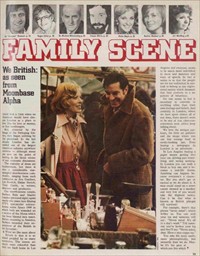
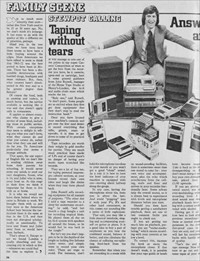
THERE A TIME when no American would have chosen London as a place to live. Not for love or money, or free hamburgers.
But, attracted by the image of the Swinging Sixties, they began arriving by the planeload. In the last decade London has absorbed one of the largest American colonies anywhere overseas - although many are now on the point of leaving in the bitter winter of our economic discontent.
The majority of them are businessmen, but there is also a considerable star-spangled showbusiness community, ranging from such luminaries as Ava Gardner, Lee Remick, Elaine Stritch, Tony Curtis, to writers, directors and producers
One showbusiness couple, Barbara Rain and Martin Landau (pictured right) spent nearly two years here filming ITV's spectacular science- fiction series Space 1999 in which both are stranded on a section of the Moon which has been blasted into space. Before returning to America, Barbara recorded their impressions of the British in the Seventies :
What we like most about Britain is that it is an island peopled by so many eccentrics. The streets are much more colourful than they are back home in Los Angeles Angeles and everyone seems to be much more individual in dress and manners and ways of speech. In fact it seems to us that the people are far too individual in outlook to belong to any regimented society which demands that they conform to a set pattern of behaviour.
No one seems to feel it necessary to conform, to anything other than their own feelings and beliefs. And certainly in London, where we have spent almost all of our time, there doesn't seem to be any of that class-consciousness your critics keep talking about.
We love the antique parlours, the little art galleries and the shops where you can buy strange food in exotic-looking jars. Even buying a newspaper in London is an adventure.
In Los Angeles buying a paper means getting into your car, driving past everything and seeing nothing. In London you can walk a block to buy one and it becomes a real-life drama. Anything can happen because everyone's a character. But you don't get as excited as we do about it. A man could stand on a street corner dressed as a monkey and very few of you would take the slightest notice. Can it be that what is known as British phlegm still survives?
For example, there's that phrase "never mind", which tickles us. You can stub your toe and someone will say: "Never mind. It's all in a day's work." Tell someone you've broken your leg and they'll say: "Never mind, dear. Have a nice cuppa tea."
You take life more easily, more philosophically, less earnestly than we do. Maybe it's the pace at which you live which is so much more leisurely than ours- rather like New York used to be 25 or 30 years ago. No, we don't think it's lethargy. It has more to do with the quality of life: a different set of priorities, perhaps.
Mind you, in the two years we have been here there seems Lo have been a little fraying around the edges. Most Americans we have talked to seem to think that 1965-72 was the best period to have been in Britain. There has been a discernible deterioration with football thugs, hooligans and more violence. But, then, what country hasn't deteriorated in this way and to a far greater degree than Britain ?
Of course the food, both in cooking and variety, is much better, but the service available is nothing like it was and that doesn't apply only to restaurants.
It applies to almost everyone who claims to give a service of some kind, including those in public service. With certain exceptions they seem to delight in telling you what you can't have, what they cannot do and what you cannot do, rather than what they can and will do for you. To Americans particularly that seems a strange attitude.
That apart, the one aspect of English Life we don't like is sending children away from their parents for schooling. It would never enter our minds to send our own daughters, Susan, who is 14, and Juliet who is nine, away from us. At this stage in their lives we think it important for them to live with us at home.
It is why we would not leave them when we came to Britain to work. We brought them with us they went to the American School here because the curriculum there is the same as that in the U.S. and they were not disrupted scholastically or emotionally. To have sent Susan and Juliet away from us would have been barbaric.
That's about it. Except to say we found London a totally absorbing and fascinating city in which to live - whenever we could find time to explore it.
Week in view column, edited by Clive Ranger and Anthony Wall, p15
With world sales totalling many millions of pounds, it will come as no surprise to hear that Space 1999 is to enjoy a second series, Work has already started at Gerry Anderson's studios in Pinewood and the first series' stars, husband-and-wife Barbara Bain and Martin Landau, will again take charge of Moonbase Alpha.
The underwhelming start of Year 2 in London, on Saturday mornings during a magazine show "especially for youngsters", at least managed to add a photo. p27
11.30 SPACE 1999
The Metamorph
Fasten your safety put the anti-gravity boots and take off to Moon Base Alpha. This morning, terror from a planet, a planet of death. But a new life is on the way for a beautiful girl caned Maya.
Today's guests are Brian Blessed, Anouska Hempel. Catherine Schell and Tony Anholt.
Space: 1999 copyright ITV Studios Global Entertainment